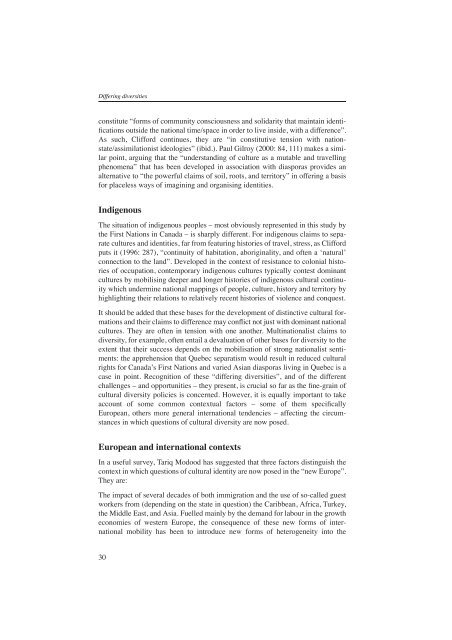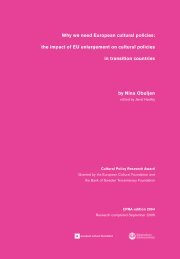Tony Bennett, Differing diversities - Council of Europe
Tony Bennett, Differing diversities - Council of Europe
Tony Bennett, Differing diversities - Council of Europe
You also want an ePaper? Increase the reach of your titles
YUMPU automatically turns print PDFs into web optimized ePapers that Google loves.
<strong>Differing</strong> <strong>diversities</strong>constitute “forms <strong>of</strong> community consciousness and solidarity that maintain identificationsoutside the national time/space in order to live inside, with a difference”.As such, Clifford continues, they are “in constitutive tension with nationstate/assimilationistideologies” (ibid.). Paul Gilroy (2000: 84, 111) makes a similarpoint, arguing that the “understanding <strong>of</strong> culture as a mutable and travellingphenomena” that has been developed in association with diasporas provides analternative to “the powerful claims <strong>of</strong> soil, roots, and territory” in <strong>of</strong>fering a basisfor placeless ways <strong>of</strong> imagining and organising identities.IndigenousThe situation <strong>of</strong> indigenous peoples – most obviously represented in this study bythe First Nations in Canada – is sharply different. For indigenous claims to separatecultures and identities, far from featuring histories <strong>of</strong> travel, stress, as Cliffordputs it (1996: 287), “continuity <strong>of</strong> habitation, aboriginality, and <strong>of</strong>ten a ‘natural’connection to the land”. Developed in the context <strong>of</strong> resistance to colonial histories<strong>of</strong> occupation, contemporary indigenous cultures typically contest dominantcultures by mobilising deeper and longer histories <strong>of</strong> indigenous cultural continuitywhich undermine national mappings <strong>of</strong> people, culture, history and territory byhighlighting their relations to relatively recent histories <strong>of</strong> violence and conquest.It should be added that these bases for the development <strong>of</strong> distinctive cultural formationsand their claims to difference may conflict not just with dominant nationalcultures. They are <strong>of</strong>ten in tension with one another. Multinationalist claims todiversity, for example, <strong>of</strong>ten entail a devaluation <strong>of</strong> other bases for diversity to theextent that their success depends on the mobilisation <strong>of</strong> strong nationalist sentiments:the apprehension that Quebec separatism would result in reduced culturalrights for Canada’s First Nations and varied Asian diasporas living in Quebec is acase in point. Recognition <strong>of</strong> these “differing <strong>diversities</strong>”, and <strong>of</strong> the differentchallenges – and opportunities – they present, is crucial so far as the fine-grain <strong>of</strong>cultural diversity policies is concerned. However, it is equally important to takeaccount <strong>of</strong> some common contextual factors – some <strong>of</strong> them specifically<strong>Europe</strong>an, others more general international tendencies – affecting the circumstancesin which questions <strong>of</strong> cultural diversity are now posed.<strong>Europe</strong>an and international contextsIn a useful survey, Tariq Modood has suggested that three factors distinguish thecontext in which questions <strong>of</strong> cultural identity are now posed in the “new <strong>Europe</strong>”.They are:The impact <strong>of</strong> several decades <strong>of</strong> both immigration and the use <strong>of</strong> so-called guestworkers from (depending on the state in question) the Caribbean, Africa, Turkey,the Middle East, and Asia. Fuelled mainly by the demand for labour in the growtheconomies <strong>of</strong> western <strong>Europe</strong>, the consequence <strong>of</strong> these new forms <strong>of</strong> internationalmobility has been to introduce new forms <strong>of</strong> heterogeneity into the30














